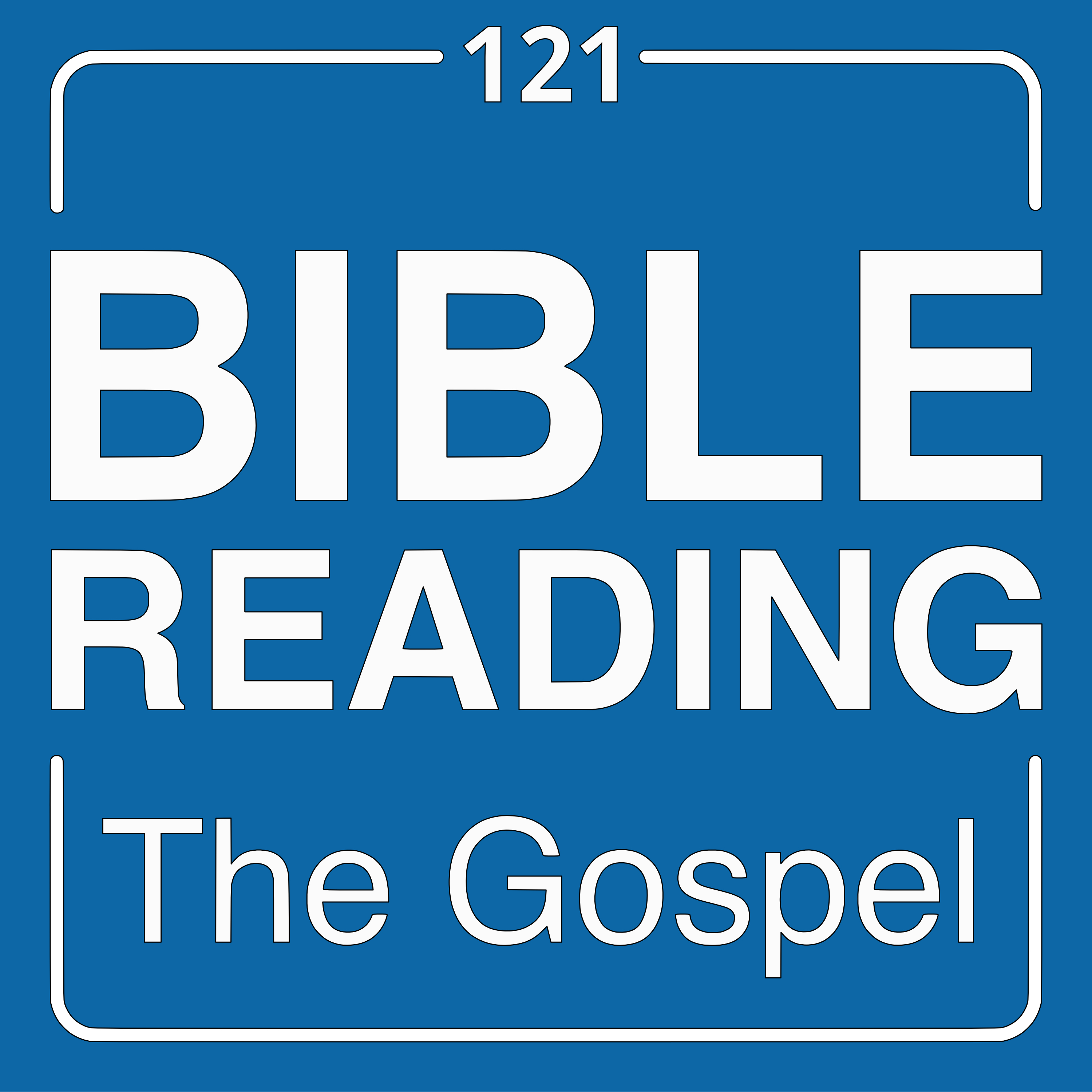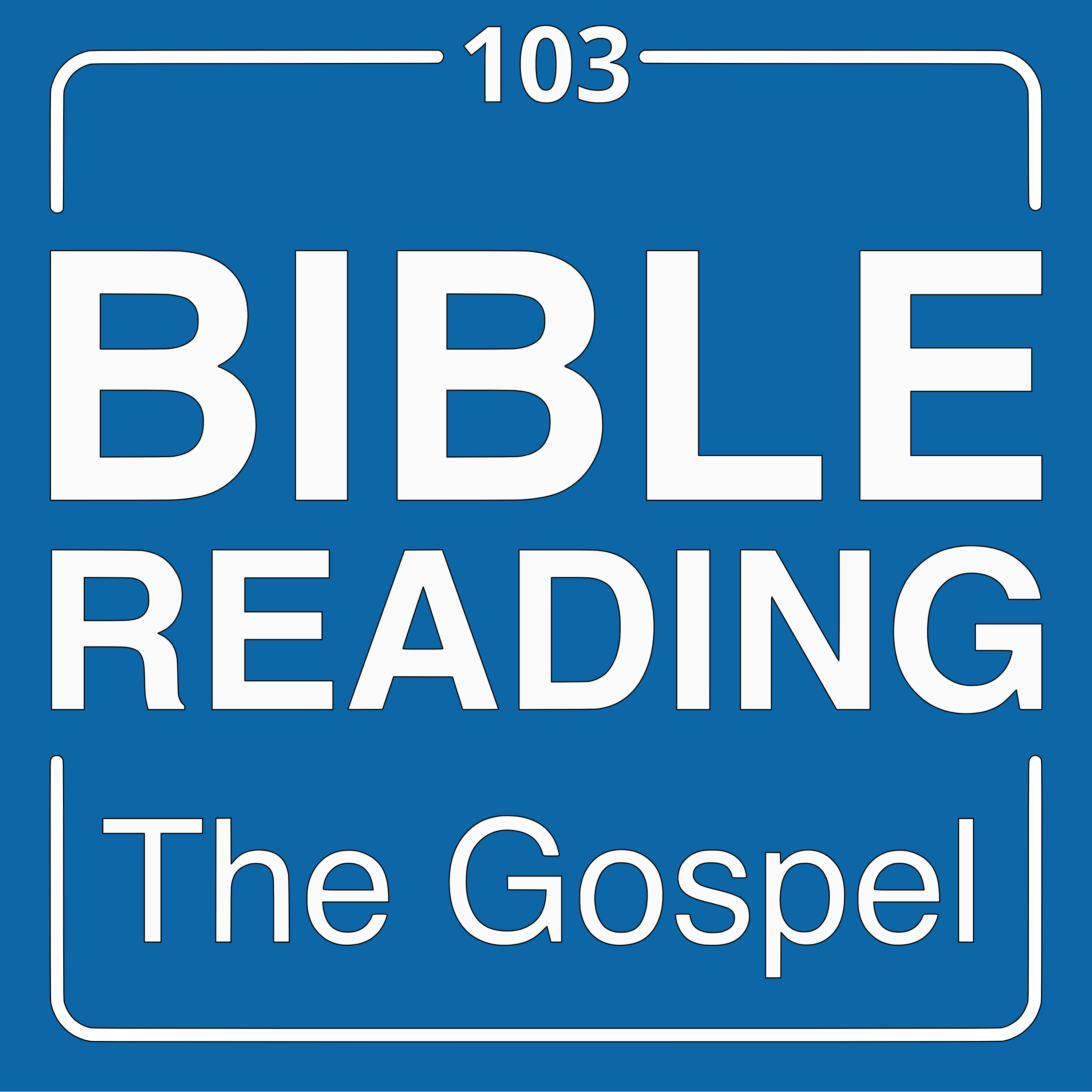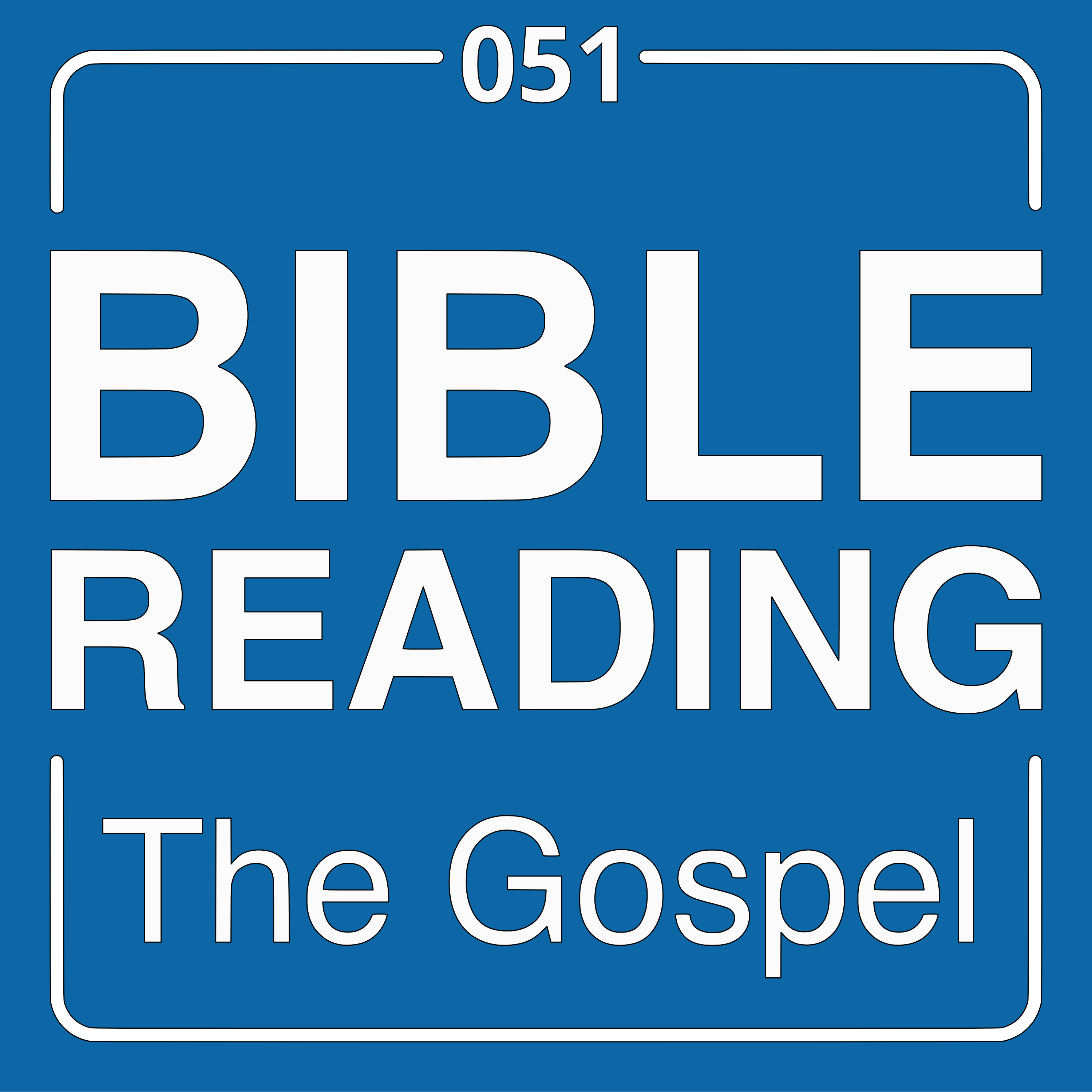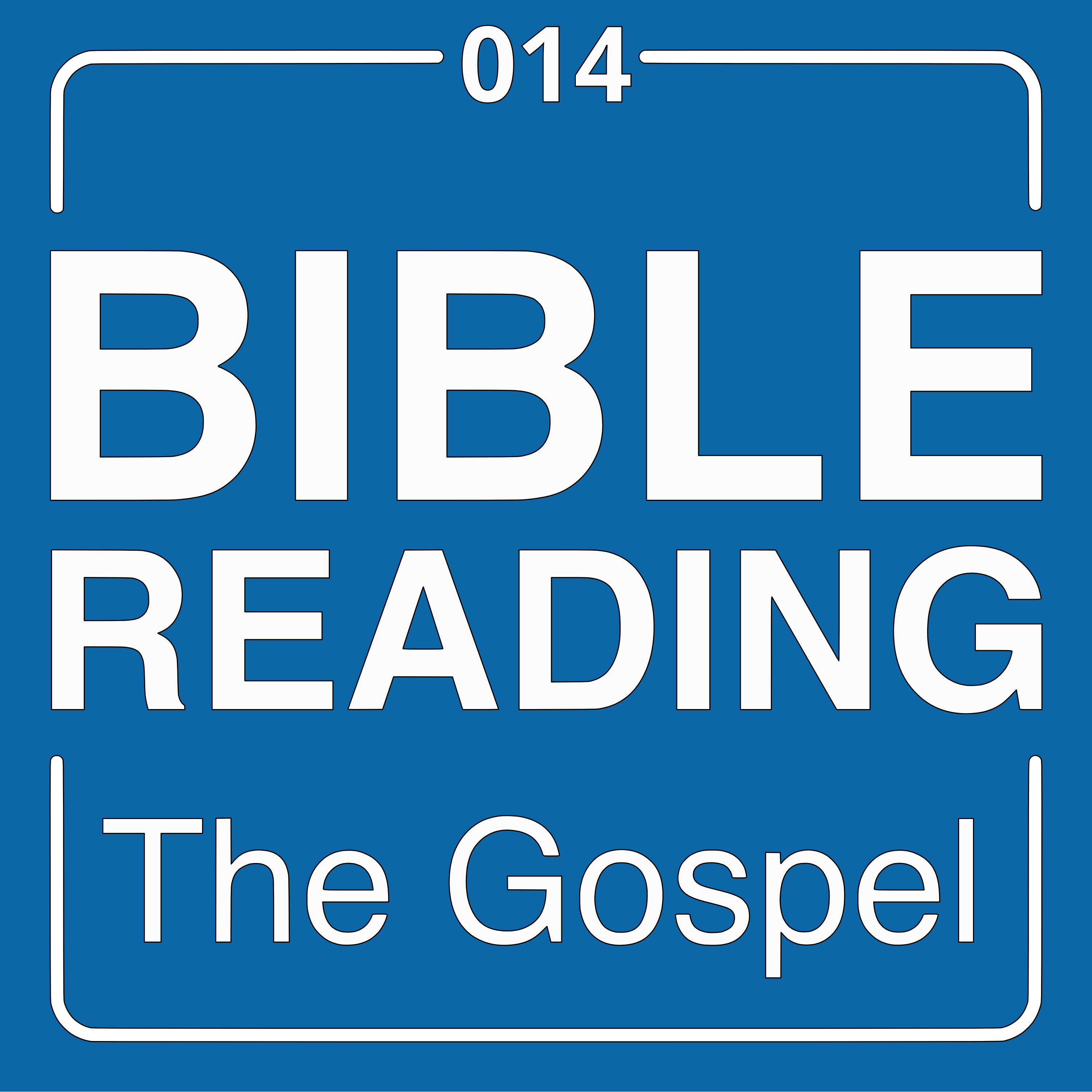Episode Transcript
[00:00:24] Speaker A: My name's Jeff, and my name is Gabriel.
[00:00:27] Speaker B: Today on reading the Gospel, we are entering Luke, chapter 15.
Parables of lost value.
Follow along with us today as we start with the first parable found in verse one through verse seven.
[00:00:46] Speaker A: Now the tax collectors and sinners were all drawing near to hear Jesus and the Pharisees. And the scribes grumbled, saying, this man receives sinners and eats with them.
So he told them this parable.
[00:01:03] Speaker B: What man of you, having a hundred sheep, if he has lost one of them, does not leave the 99 in the open country. And go after the one that is lost until he finds it. And when he has found it, he lays it on his shoulders, rejoicing. And when he comes home, he calls together his friends and his neighbors, saying to them, rejoice with me, for I have found my sheep that was lost. Just so I tell you, there will be more joy in heaven over one sinner who repents. Than over 99 righteous persons who need no repentance.
This is a parable that I think many kids could tell. It's in many kids children's books. It's a story we share. So it's one of the more famous ones. But this shepherd has a hundred sheep, and one of them is lost.
How many sheep would you stay in for? It's a cold night, it's a dark night. You've been out in the wilderness. How many sheep would you need in your herd to say, one's not worth it?
[00:02:15] Speaker A: This parable shows through a story that was immediate reality for Jesus listeners, how important each sheep is. And by extension, how important each one of us are for God. Because the purpose of this parable was to set a contrast between the Pharisees who felt that they do not need repentance, they are righteous.
And the tax collectors and sinners who were coming close to Jesus Christ because they needed repentance.
This parable kind of expands that story of a tax collector and a pharisee who went to the temple to pray. And one was self righteous. And thank you, Lord, that I'm not as that bad as that guy next to me. Look at him.
And Jesus finished that story that the tax collector who was experiencing repentance with a contrite heart. That guy rather went home, counted by God as being righteous. Than the pharisee who felt that he doesn't need repentance. So the idea is how important the sinners and the tax collectors are. And maybe a quick parenthesis, why the tax collectors are before sinners. In this list and in many other verses, in the New Testament, in the gospel, it is because they were considered double sinners. First, they sold their soul to the roman controlling power to work for the roman government and to take taxes from their own brothers and sisters, from their own towns and villages.
And the second, they had to bribe the roman authority to get that job because it was such a competition. So they were borrowing some money and now it was time to recoup that money. So they're always charging more than they were supposed to do. They were double sinners. They are listed here before sinners.
What is interesting here, that these sinners and tax collectors were drawing near to hear him. This is why Jesus found this amazing parable, this story that resonates with the human heart of everyone.
[00:04:47] Speaker B: For me, again, looking at the numbers, we see a hundred shepherd has 100 sheep. That really doesn't have much context. When you and I climbed long's peak a few years ago, we were driving out west and as we were going through, I think, Nebraska, some of the cattle farms, it seemed like we were driving by the cow farm for about ten minutes. It was so huge, so massive, and however many hundreds of thousands or millions of cows were there, that's a big farm and I don't know how many they lose a day, but I can't imagine if one walked away.
The owner of that operation would go out and go search until he found that cow. So with that in mind, we look at this story with these mega farms. But back then, 100 sheep, I imagine, would be a decent size herd, like.
[00:05:45] Speaker A: A lot of sheep, more valuable than today.
[00:05:47] Speaker B: Yeah, this is someone who has a lot. And if he loses one here or there, it's not really that big a deal. And I'm guessing most shepherds, yeah, if they can get it, the sheep back that do it, but if it's going to put them out, if they're going to have to go out of the way or get hurt, they're just going to go to bed. I'm done for the day.
But this shepherd sees a value, one in 100.
[00:06:17] Speaker A: It is like a mom who might have, let's say, multiple children, let's say ten children and one is sick, and she looks at him in bed and say, well, I have other nine.
No mom would ever do that. Because each one is important. You have a relationship with each one. And this story reflects God's love, which is tailored for each one. It is individualized, it is built one on one over years of him investing in us. This parable really illustrates the love of God that is for each one of us. And that my mind goes to psalm 23. You might be knowing it by heart. And you want to say a couple of lines from psalm, the Lord is.
[00:07:05] Speaker B: My shepherd, I shall not want. He maketh me to light ground down in green pastures. He leadeth me beside the still waters.
[00:07:12] Speaker A: Providing everything that we need.
[00:07:15] Speaker B: So the other thing that's interesting because we need to think of this parable in relation to the other two as well. Here we have a sheep that's lost. It doesn't seem to deliberately want to leave. Maybe it wandered off, not paying attention, didn't realize the group had walked away. It stood by a nice piece of grass eating while the shepherd moved on.
It has left the sheepfold. It has left this group, not necessarily intentionally. And the shepherd goes out of his way, he walks away.
When I think of this in terms of a community, I ask the question, when someone leaves our community, what do we do to get them back? Do we just say, hey, they'll be back one day, or do we go out and we look for them, hey, how's it going? We've missed you. You haven't been here.
[00:08:19] Speaker A: We are going to react based on the relationship we had and the value.
[00:08:24] Speaker B: We put on them.
[00:08:25] Speaker A: The value we put on them, right?
[00:08:27] Speaker B: Yeah.
So if it's something that's more valuable to us, we're going to make more effort to go and to find.
Yeah.
[00:08:37] Speaker A: And I like how the story ends.
This joy of finding the lost sheep is being shared with his friends and neighbors, saying, rejoice with me for I have found my sheep that was lost.
And Jesus said, now refocusing our attention to heaven. I tell you, there will be more joy in heaven over one sinner who repents than over 99 righteous persons who need no repentance.
[00:09:12] Speaker B: Should I then go out and sin so I can repent and there'll be joy in heaven?
[00:09:18] Speaker A: If you feel that you can produce repentance and you can produce it whenever you want. But that is a deceit. We cannot produce repentance. It is the gift of God. Repentance is the gift that comes from above. It is the result of the work of the Holy Spirit. If we commit a sin intentionally so we can later produce more joy to God. I don't think that know biblical because you hurt God a lot first. And it is like a relationship between a father with a children. If the children will rebel intentionally, they might turn around later. But that pain is still going to be there for a while. Yeah.
[00:10:09] Speaker B: And the Bible says we've all sinned so every single one of us, no matter how righteous we are now, at some point, we were the one sinning and we came to repentance. And just because we haven't necessarily needed that recently, our lives might be in a place where there's less outright rebellion against God, less parabesis. It doesn't mean we need to go manufacture it.
[00:10:36] Speaker A: Even if we could.
[00:10:37] Speaker B: Yeah, even if we could, we should be in a place where we desire to be in the sheepfold. We desire to be there. We don't need to go get lost to be found.
So what does this passage tell us about God?
[00:10:54] Speaker A: As we mentioned, it is his infinite valor that he places on us. For God so loved the world.
And in John 316, by world he means the lost people.
For God so loved the world that he gave his only son, that whoever believes in him shall not perish but have eternal life.
Jesus Christ came to die for these people who are drawing closer to him. This is the essence of the gospel for me.
[00:11:25] Speaker B: This tells me that God is not a passive God.
He's not this God that set things in motion and just let everything play out as it is. But he actively intervenes in our lives to save us when we need.
[00:11:43] Speaker A: The way this parable spoke to me was this time was a little bit different.
Throughout years reading this parable, it was easy for me to identify with a lost sheep. I know what is that, and I know how much God has searched for me, to find me and to bring me back and directly through the Holy Spirit, through the word of God, through primarily my mom, who was a godly woman, and a group of Christians that a little church were attending there, here and there. But this time I identify a little bit more with the Pharisees and the scribes.
I don't know about you or other christians, but once in a while I find a little bit of this fairy sake behavior or attitudes in my life. And I imagine myself while reading this parable that I was there at the table and I was unhappy that I didn't receive all the attention.
In fact, Jesus paid more attention to the tax collectors, those double sinners and other kind of sinners.
And at the end of the parable, Jesus Christ looks into my eyes and says, I tell you, there will be more joy in heaven over one of the sinners who repents than over 99 righteous persons like you who feel that they didn't need repentance. And I said, wow. And my prayer was, Lord, help me never walk into the shoes of disguise. And if there is anything like that in my life. Remove it and cleanse it. And help me have a relationship with you. Like the shepherd's relationship with his sheep. Let's pray.
[00:13:40] Speaker B: Father God, there might be two different kinds of people listening today. Those who feel like the lost sheep, who have looked up and realized that they're not where they want to be and their life is out of control, or they need you. And I pray as the good shepherd, you will find them and you'll pick them up and hold them close to you and take them back to the fold.
Father, there's those of us, as Gabriel have said, who are in the fold and are looking at others and thinking, why is Jesus spending time with them?
And I pray that you forgive us, that you change our hearts, that you place in us a joy. So that when one sheep comes back, that we rejoice.
That we celebrate, that we stand there as well, in full happiness and exaltation. That one sinner has been saved. So please work in our lives and draw us closer to you. In Jesus name. Amen. Amen.



